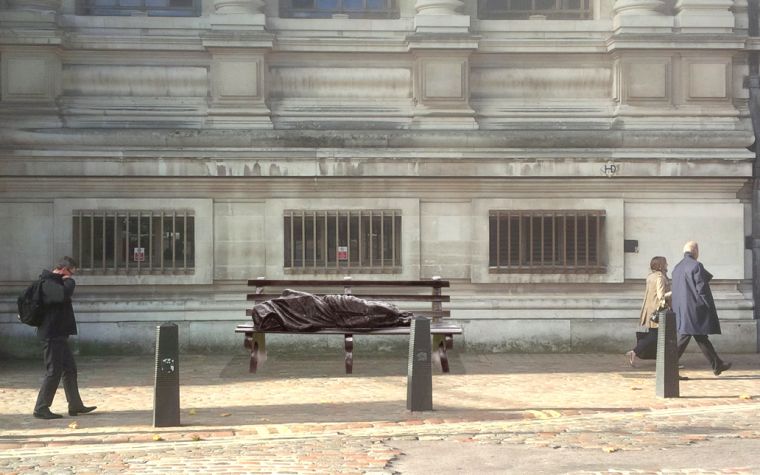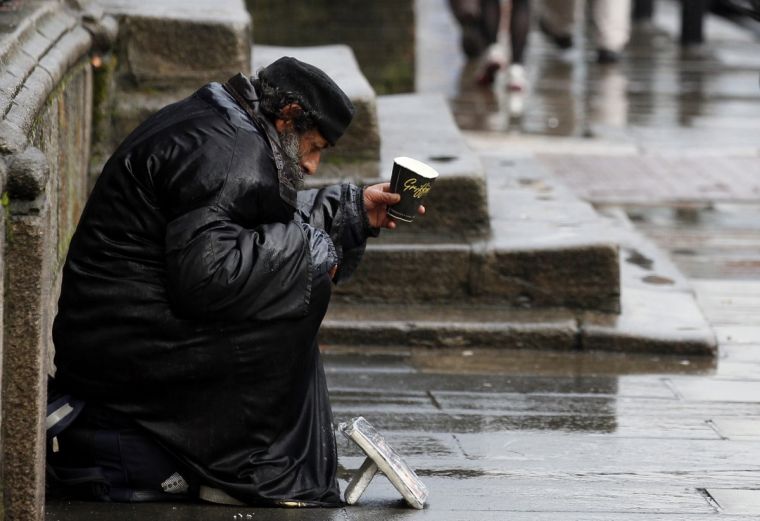J John: Three gifts you can give homeless people this Christmas
Homeless people seem to be an increasingly common feature of our urban landscapes, sitting on the streets with their sleeping bags and blankets. We may be aware, too, that such people represent the visible tip of an iceberg: there are the 'hidden homeless' camped out on the floors of friends but who have nowhere to call their own.
Attitudes to the homeless vary. Some people dismiss 'the homeless' with no sympathy: 'it's their own fault', 'they should get a job'. Others throw them coins and move on swiftly. But others find themselves troubled and ask why doesn't the government do something about them? The reality, I suspect, is that most of us don't bother ourselves too much with the plight of those who are homeless. After all, we like to live in tidy worlds of warmth and cleanliness, and these untidy, bedraggled and troubling people just don't fit in.

The Bible in Lamentations 3:19–21 echoes the discomfort of the homeless: 'The thought of my suffering and homelessness is bitter beyond words. I will never forget this awful time, as I grieve over my loss. Yet I still dare to hope when I remember this.'
I think we need to consider the plight of those who are homeless and let me suggest we offer them three gifts.
First the gift of significance. There are many unfortunate aspects of being homeless but one of the worst is the way that you become insignificant; you become, in effect, invisible. People may step around you as if you were some sort of hazard but deep down, where it really counts, they do not see you. You can also be dehumanised by simply being reduced to 'an issue' and referred to as 'the homeless' as if you were some urban nuisance like waste disposal.
Yet homelessness is about people. Every homeless person is an individual with a history of hopes that failed, dreams that became nightmares, and promises that were not delivered. They are like us except for this one thing: with them life went wrong. Every single person on the pavement has a sad and complex story, and those complexities are another reason why we need to avoid carelessly lumping them all together under the cold label 'the issue of the homeless'. They are people and one size does not fit all.
Actually, if we are Christians we have even stronger reasons for treating such people as being significant. For a start, we should remind ourselves that a homeless person is someone made in the image of God. Indeed we should go further, remembering that we serve Jesus who was born into homelessness, who said of himself that he had 'no place even to lay his head' (Matthew 8:20) and who, for our sake, was reduced to public humiliation.
Let me suggest one way of giving a homeless person significance: if you regularly pass the same individual, try to get his or her name and, from then on, greet them with it. It's a reminder to them, and to you, that they are human and not a statistic.

Second, we need to give homeless people the gift of sympathy. True sympathy is something more than making homeless people into an issue with which to score political points. No, I mean genuine deep concern. After all, no one makes homelessness their career choice. These are people for whom something went so badly wrong that they started down the slippery slope that leads to life on the pavement.
Of course in today's merciless world, mistakes go unforgiven and any slippery slope is well lubricated: landlords evict, banks foreclose, bailiffs arrive and doors are closed. And once you are down you tend to stay down. It's not easy applying for a job when your address is 'no fixed abode', or looking for jobs from a park bench, or remaining employed when you can't wash regularly. In every statistic the odds are stacked against homeless people: they are more frequently abused, have worse health and have appallingly low life expectancies. If you still struggle to find any sympathy for them, take a moment and replay your own life. It's not hard to find a point where, had events been only slightly different, it could be you there shivering as you hold out your Styrofoam cup. Indeed, we should all reverently say, 'There but for the grace of God go I.'

Finally, we should offer the gift of support. We may want to give money but a thoughtful and strategic approach to giving support is better than the impulsive, irregular gift. Precisely because of the complexities involved, getting people out of homelessness is hard. It takes time, money and sustained effort. One of the problems with the official efforts to deal with homelessness is that their solutions tend to focus on dealing with the symptoms not the cause.
It is encouraging that many of the initiatives with homeless people have come out of Christianity: the Salvation Army, for a start, and Shelter, one of the leading charities in this area, was founded by the Reverend Bruce Kenrick in 1966. Let us support the Salvation Army and Shelter and maybe some of us need to support by pioneering some new initiatives and projects.
One of the most intriguing sayings of Jesus is: 'It is more blessed to give than to receive' (Acts 20:35). To offer those who are homeless significance, sympathy and support isn't easy but here, from the most reliable authority, we have the promise that if we do so we will be blessed.











